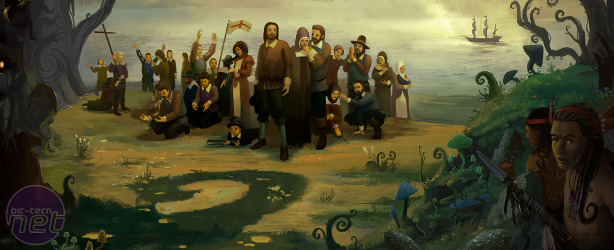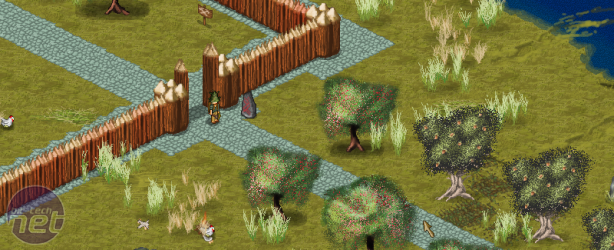
Salem Preview
Publisher: Paradox InteractivePlatform: PC exclusive
Release Date: TBA 2011
Salem is, conceptually at least, one of the most exciting games we've seen for a long time. Developed by two-man outfit Seatribe, Salem builds itself around all the most interesting, anarchic parts of MMO design; player freedom, user-generated communities and shared spaces with only finite resources.
Set in a mystical land that's New England by name alone, Salem casts all players as settlers in the New World and invites them to explore and survive alongside the other players. There are no missions or formalised factions from which to choose, merely an expansive wilderness with occasional monsters and a lot of trees and rocks.
The trees and rocks are more important than they sound, though, as all crafting resources in Salem are finite in number. If you want to build a house then you'll need to cut down a tree or two for the wood, but with every other player probably wanting to build their own houses too, there might not be enough trees to go around – so players have to think about conservation and forestation if they want to keep Salem comfortable. It's best to plant a tree for every one you fell, in other words.
This hands-off approach that Seatribe has planned for Salem could really pay off. With players forced to govern themselves – or not – Salem essentially becomes more of a social experiment than a game per se, and the community is essentially able to reshape the world however it sees fit. All it would take to completely change the game would be one charismatic player who could rally others to their cause. Salem's very geography could change if players decided they wanted to reshape the world as a wasteland or limitless wilderness, while political and economic processes are potentially even more exciting, as guilds and clans naturally begin to form and bristle against each other. War is probably inevitable and, given the name and choice of the setting, witchhunts are a distinct possibility!
One idea that Seatribe has implemented to stop matters getting too out of hand, however, is permanent death. If you die in Salem, that's it – you have to start again with a new character, no items and no skills. You'll also lose a lot of political sway, at least temporarily, as your friends list will be reset and, with no global chat feature, you'll have to track down your pals the hard way.
Permanent death is a gutsy move, and one that means Salem runs a real risk of being seen as a super hardcore MMO, despite the simplistic, stale cartoon graphics. A large number of players are likely to avoid Salem altogether, rather than risk the heartbreak of virtual loss. Those who do give Salem a go, however, should find that permanent death helps to make the community a cautious one, not easily pushed to extremes – and if any players do get out of hand, they can be permanently pushed back!
Unfortunately, for the moment at least, while the potential is great, much of it is yet to be fully realised. Salem is still in the Alpha stage, with cutesy graphics that seem strangely at odds with the depth of the gameplay.
Chatting with Seatribe's co-founder and lead artist Björn Johannessen revealed that much of Salem's future was still hidden in fog too, as not even the details of the financial model had been ironed out yet. Salem will be free-to-play in the most basic form for sure, but it's still not clear to developers whether it will be totally free, financed by microtransactions or littered with advertising. That's a worrying lack of organisation for an MMO that already has to accelerate from Alpha to full release by the end of the year.
Salem is being developed by Seatribe and will be pubished by Paradox Interactive.

MSI MPG Velox 100R Chassis Review
October 14 2021 | 15:04











Want to comment? Please log in.